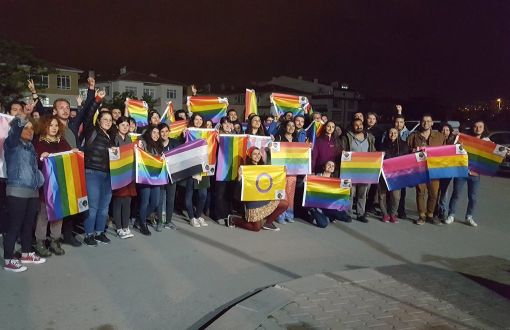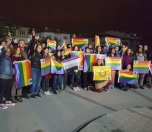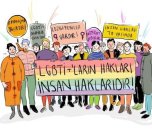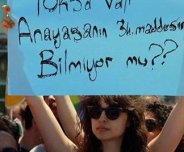* Photo:Yıldız Tar / Kaos GL
(METU students after being released from detention)
Click to read the article in Turkish
Releasing an "Urgent Action" on October 30, Amnesty International has launched a petition for 18 students and one academic put on trial for attending the Middle East Technical University (METU) Pride Parade.
In its petition addressed to the Ministry of Justice, the organization has said, "I call on you to ensure that charges are dropped against the 18 METU students and the academic for their alleged participation in the Pride Parade on May 10, 2019. No one should be prosecuted for exercising their right to freedom of expression and peaceful assembly."
With a lawsuit filed against them, 18 METU students and one academic will have their first hearing on November 12.
CLICK - Lawsuit Against 19 METU Students for Joining Pride Parade
'Responsibility to maintain public order lies with state'
Amnesty International has shared the following information in its urgent call:
"Hypothetical risks cannot establish legitimate grounds for prohibiting a peaceful assembly. The principles of necessity and proportionality require consideration of all relevant circumstances, the impact on the legitimate concern protected and the possibility that the risk will concretize, and whether less restrictive means would suffice.
"The responsibility to maintain public order and to facilitate the enjoyment of the right to freedom of peaceful assembly lies with the state and its organs, including its law enforcement agencies.
'Right to peaceful assembly hindered'
"The 18 METU students and the academic have been charged under the Law on Meetings and Demonstrations (No. 2911). This law has frequently been used to hinder the exercise of the right to peaceful assembly in Turkey due to its restrictive nature and its arbitrary application.
'Decision to disperse is the last resort'
"States have a positive obligation to facilitate peaceful assemblies in law and in practice. As is the case in Turkish law, the exercise of the right to freedom of peaceful assembly is not subject to permission of government authorities; this right is also protected under international law and standards in conventions Turkey is a party to.
"Any decision to disperse an assembly should be taken only as a last resort and carefully in line with the principles of necessity and proportionality."
What happened?
On November 18, 2017, Ankara Governorship indefinitely banned all public LGBTI+ events in Ankara by making use of extraordinary powers afforded to it under the state of emergency in place at the time in Turkey. The governorship based its decision on grounds including the risk that such events may incite "hostility," or "draw a negative reaction from certain parts of the society due to certain social sensitivities."
Following the end of the State of Emergency rule in July 2018, a new decision for a similar ban was taken by the Ankara Governorship on October 3, 2018. Ankara based LGBTI+ organizations Kaos GL Association and Pink Life separately filed a legal challenge on the grounds that the indefinite blanket ban taken under the State of Emergency rule violates the freedom of expression and freedom of assembly and association.
The ban was finally lifted by a regional administrative court decision on 19 April 2019 that found the ban to be unconstitutional even under State of Emergency law. However, METU administration relied on the second ban decision by Ankara Governorate dated 3 October 2018, leading to the police intervention at the METU pride parade on May 10, 2019.
A lawsuit has been filed against 18 students and one academic on the ground that they attended the METU Pride Parade in 2019. (TP/SD)








